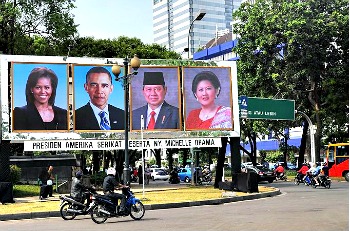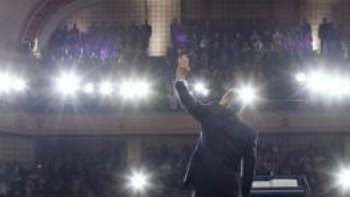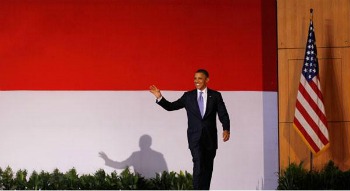The Public Diplomacy of Obama’s Indonesia Visit
Not much imagination is required to appreciate the impact in Indonesia of Barack Obama‘s recent visit. There he was, using phrases of the Indonesian language not like some stumbling tourist but rather as one who has real roots in the nation. His reminiscences of his boyhood exploits stirred the spirits of this rising Pacific power that can claim the President of the United States as one of its own.
Aside from the President‘s personal ties to Indonesia, as home to the world‘s largest Muslim population this was a logical place for Obama to continue his outreach to the Muslim world. His November 10 Jakarta speech was much anticipated as a sequel to his June 2009 address in Cairo, which was a beautifully written, heartfelt appeal to build lasting bridges between the United States and Muslims around the globe.
But after a brief surge in popularity for Obama and the United States among Muslims, America‘s reputation has been in steady decline, particularly among Arabs. The reason: beautiful words are like gorgeous hothouse flowers; when exposed to the world‘s harsh environment, they quickly wilt. In the instance of the Cairo speech, the wilting was caused principally by America‘s perceived inability to advance the interests of Palestinians in their endless disputes with Israel.

Portraits of President Obama, first lady Michelle Obama, Indonesian President Susilo Bambang Yudhoyono and his wife, Ani, in Jakarta.
© Roslan Rahman/AFP/Getty Images
The deflating of the Cairo-born optimism is a shame because aside from Palestinian-Israeli matters, the Obama administration has accomplished much in its efforts to build better relations with the Muslim world. “Science diplomats,” Nobel Prize-winners amongst them, have been dispatched by the U.S. government to Arab countries to accelerate progress in places where corruption and anger have let progress pass by.
Another significant U.S. initiative has been to identify young Muslim entrepreneurs and make available to them some of America‘s great assets in mentorship and collaboration. To its credit, the Obama administration has, for the most part, been able to this without seeming unduly patronizing.
One of the interesting aspects of the Jakarta speech, compared to the one delivered in Cairo, was the relatively subdued rhetoric and the much softer approach to Islam. In Cairo, the President spoke at some length about Islam and its role in today‘s society, saying:

President Obama Speaks to the Muslim World from Cairo, Egypt. June 04, 2009.
© whitehouse.gov

The crowd reacts as President Barack Obama delivers a speech in the Field House at the University of Indonesia in Jakarta, Indonesia, Nov. 10, 2010.
© Pete Souza, Official White House Photo.
By contrast, the Jakarta speech was Cairo-lite. The President‘s comments were more about Indonesia and less about Islam, a somewhat strange altering of course given the need for continued assertive outreach to Muslims. His remarks about Islam were more detached:
“Across an archipelago that contains some of God‘s most beautiful creations, islands rising above an ocean named for peace, people choose to worship God as they please. Islam flourishes, but so do other faiths…. Here we can find the ability to bridge divides of race and region and religion—by the ability to see yourself in other people.”
He added, “That spark of the divine lives within each of us. We cannot give in to doubt or cynicism or despair. The stories of Indonesia and America should make us optimistic, because they tell us that history is on the side of human progress; that unity is more powerful than division; and that the people of this world can live together in peace. May our two nations, working together, with faith and determination, share these truths with all mankind.”

President Obama delivered a speech at the University of Indonesia in Jakarta on November 10, 2010.
© The New York Times.
As presidential speechmaking, that‘s not bad. But the references to Islam in Jakarta seem merely tangential when compared to those in Obama‘s Cairo speech. Several plausible reasons for this exist. The sting of the U.S. congressional elections earlier that week was still burning, and with nutcases in America advancing the notion that Obama is a Muslim, the White House may have wanted to avoid more overt references to rapprochement with Islam. Also toned down from the Cairo speech were references to combating violent extremism.
This case illustrates how fears about potential domestic political blowback might inhibit the Obama White House in its outreach efforts. Good intentions abound within the administration, but a restive public and a combative new Congress may limit diplomatic ambition. Also, the post-Cairo disappointment among Arab Muslims may have made the Obama administration newly wary about the costs of creating unrealistic hopes.
As the articles cited in this edition of PDiN Monitor illustrate, international news coverage reflected lower expectations about the Jakarta speech – perhaps a facet of the diminished clout of “Obamamania” worldwide. But the coverage did recognize that outreach to the Islamic world remains an Obama priority.
Although no single speech – or even series of speeches – will “fix” the relationship between the United States and the Muslim world, President Obama deserves credit for recognizing this as an incremental process. He will need to reiterate, frequently and in many places (including at home in the United States), the message he delivered in Cairo and Jakarta.
____________________________________________________
Media Roundup: President Obama’s Trip to Indonesia
President Obama‘s long-awaited visit to Indonesia was covered extensively by many international news outlets in the days sur-rounding his trip. Below is a selection of stories concerning the November visit as aggregated by CPD‘s PDiN Research Team.
Obama’s Indonesian Challenge
The New York Times
Obama Visits a Nation That Knew Him as Barry
The New York Times
Obama arrives in Indonesia
Al Jazeera
Obama reality show in Indonesia rewards people who know presidential trivia
The Washington Post
Barack fever grips Indonesia
The Australian
Obama tells story of his childhood in Indonesia
The Jakarta Post
Obama’s new bid to engage the Muslim world
BBC News
In Jakarta Speech, Some Hear Cairo Redux
The New York Times
In defense of Obama’s Muslim outreach
Foreign Policy (Blog)
Issue Contents
- November 2010: The View from CPD
- The Public Diplomacy of Obama’s Indonesia Visit
- Obama in Indonesia: An Abbreviated but Potent Homecoming
- In response to: Cinematic Diplomacy, Back to the Future, again…
- In response to: No More Fun & Games in Delhi
- Barack Obama’s India Trip: The View Through a Soft Power Lens
Most Read CPD Blogs
-
March 22
-
February 23
-
February 22
-
April 1
-
April 11
Visit CPD's Online Library
Explore CPD's vast online database featuring the latest books, articles, speeches and information on international organizations dedicated to public diplomacy.








Add comment